ITTC-53 Banner

ITTC-53 Menu
Highlights for Thursday, 30 November 2017

A project officer (left) assists the owner of a small-scale sawmill to apply for credit under an ITTO-funded scheme. Photo: Natural Resources Development Center
A microcredit scheme established under an ITTO activity is showing promise in boosting the efficiency and profitability of small and medium-sized forest enterprises in Indonesia.
The scheme is one of several dozen projects and activities under review by delegates at the 53rd session of the International Tropical Timber Council.
The microcredit pilot scheme for small and medium-sized enterprises (SMEs), which was supported by Activity 2 (PP-A/49-287) of the ITTO Biennial Work Programme 2013–2014, was conducted in partnership with Indonesia’s Natural Resources Development Center. It issued credit of about US$12 500 to each of three companies on Java, Indonesia, with the aim of managing the scheme as a revolving fund that would provide credit for more SMEs over time.
According to the report on the activity presented to the joint session of the Committee on Economics, Statistics and Markets and the Committee on Forest Industry, such microcredit is needed in Indonesia because many SMEs and community enterprises find it extremely difficult to meet requirements for taking out bank loans.
The three companies have used the microloans obtained through the ITTO activity to invest in processing equipment and as working capital, and they have now either fully repaid the loans or are in the process of doing so; the repaid funds will be invested in other SMEs.
The scheme’s initial success is expected to encourage government institutions in Indonesia to implement a similar scheme at a larger scale.
Monitoring legal timber trade in the EU
Also today, the joint session of the Committee on Economics, Statistics and Markets and the Committee on Forest Industry received a report from FLEGT VPA Independent Market Monitoring (IMM), an initiative of the European Union (EU) and ITTO designed to support the implementation of bilateral voluntary partnership agreements (VPAs) between the EU and timber-supplying countries. VPAs are a key element of the EU’s Forest Law Enforcement, Governance and Trade (FLEGT) Action Plan, which defines the EU’s policy for promoting legal logging and the trade of legally licensed timber.
In November 2016, Indonesia became the first country to obtain a FLEGT licence under its VPA with the EU. After the first year of operation of the licence, the IMM reported the following findings:
· There has been little immediate effect of the licensing system to either boost or impair timber trade.
· Indonesian trade with the EU has changed very little since the first licences were issued in November 2016.
· Indonesia’s share of the EU market has remained stable.
Managing the Tacaná Volcano region
The Committee on Reforestation and Forest Management received a progress report today on an ITTO project (PD 668/12 Rev.1 (F)) to improve the management of natural resources in the Tacaná Volcano region shared by Mexico and Guatemala. This region is biologically rich and has ecotourism potential, but it is affected by poverty and unsustainable natural resource use.
According to the latest report, the project has:
· launched a participatory process for natural resource and biodiversity management, conservation and use in the area;
· mapped restoration, conservation and environmental services;
· established twelve nurseries for the production of seedlings of native tree species;
· improved the livelihoods of communities in the area by supporting initiatives in ecotourism and fish ponds;
· conducted a technical study to reclassify the Tacaná Volcano in Guatemala; and
· organized several workshops on technical and policy aspects aimed at conserving and managing the area’s natural resources.
Side-event on procurement
Also today, the Forest Stewardship Council held a side-event to explore national-level fiscal incentives and public procurement policies to promote sustainable forest management in tropical forests. A number of speakers called for clear procurement policies in countries to provide guaranteed markets for sustainably produced (and certified) forest products, and for other incentives to favour environmentally and socially responsible forest companies.
Committees
The International Tropical Timber Council’s three technical committees – the Committee on Reforestation and Forest Management, the Committee on Forest Industry, and the Committee on Economics, Statistics and Markets – have been meeting this week to review activities and projects and to discuss related policy issues. The Council’s Committee on Finance and Administration has also been meeting to review the Organization’s accounts and attend to other administrative matters. All four committees will present reports to the Council on Saturday 2 December.
Contact group and drafting group
The contact group established yesterday to discuss the report of the Ad Hoc Working Group to Consider Rotation in the Framework of the Selection of the Executive Director Established Pursuant to Decision 9(LII) met today. Other panels and groups to meet included the Fellowship Panel, the Panel on Sub-Account B of the Bali Partnership Fund, and the Chairperson’s Open-Ended Drafting Group.
The International Tropical Timber Council meets at least once a year to discuss a wide-ranging agenda aimed at promoting sustainable tropical forest management and the trade of sustainably produced tropical timber.
Daily coverage of the session by the Earth Negotiations Bulletin is available at http://enb.iisd.org/forestry/itto/ittc53/
Videos of the ITTO project in the Tacana Volcano region
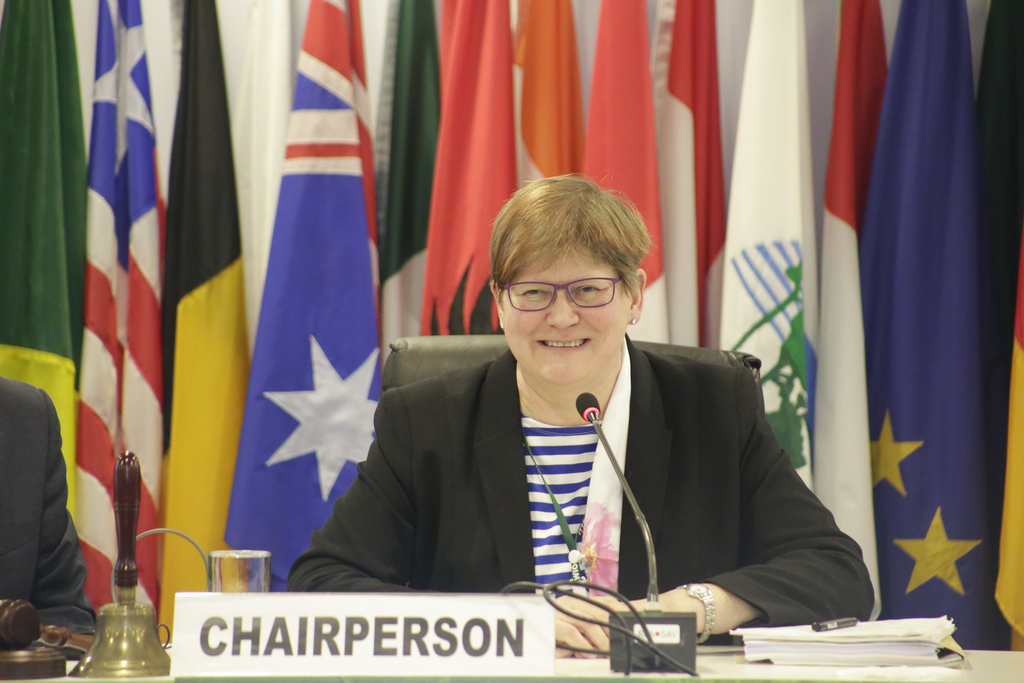
Marjukka Mahonen, Chairperson of the Committee on Reforestation and Forest Management, smiles at an intervention on day four of the 53rd session of the International Tropical Timber Council. Photo: D. Piaggio/SERFOR
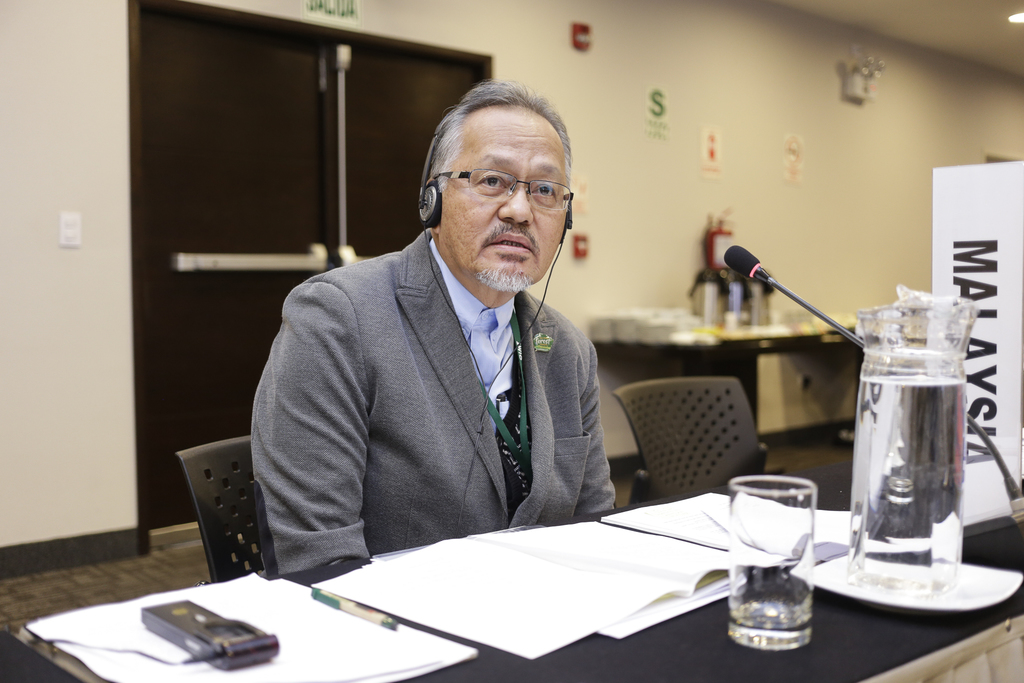
A delegate of Malaysia makes an intervention on day four of the 53rd session of the International Tropical Timber Council in Lima, Peru. Photo: D. Piaggio/SERFOR
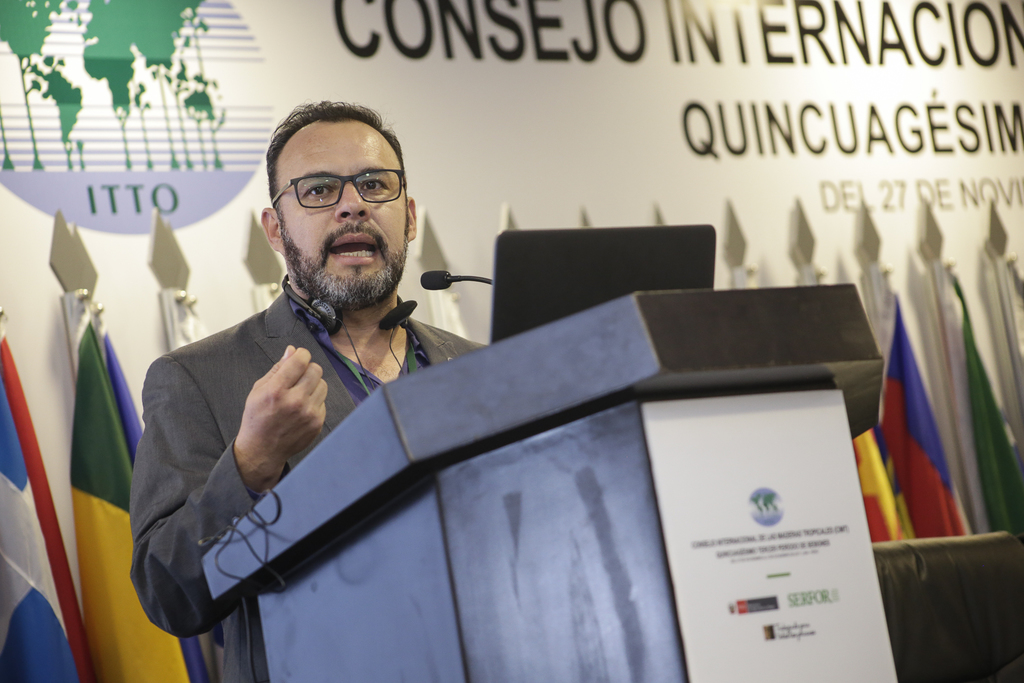
The Tacana Volcano project manager reports to the Committee on Reforestation and Forest Management on day four of the 53rd session of the International Tropical Timber Council. Photo: D. Piaggio/SERFOR
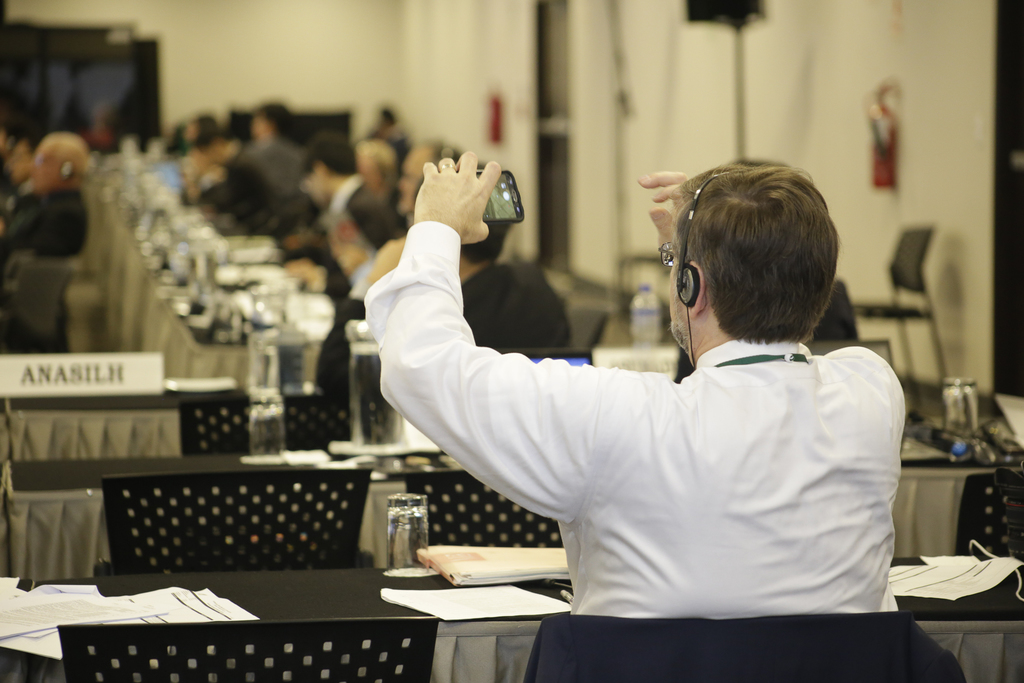
Keith Ripley of the Earth Negotiations Bulletin takes a snap on day four of the 53rd session of the International Tropical Timber Council. Photo: D. Piaggio/SERFOR
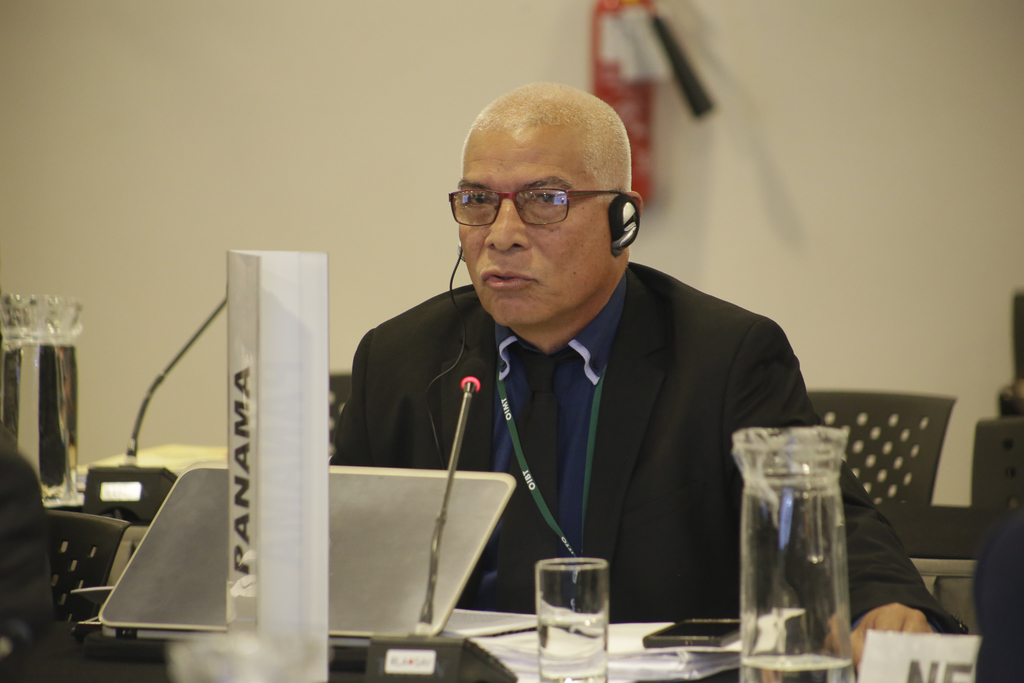
A delegate of Panama makes an intervention on day four of the 53rd session of the International Tropical Timber Council in Lima, Peru. Photo: D. Piaggio/SERFOR

Aysha Ghadiali, USA, makes an intervention on day four of the 53rd session of the International Tropical Timber Council in Lima, Peru. Photo: D. Piaggio/SERFOR
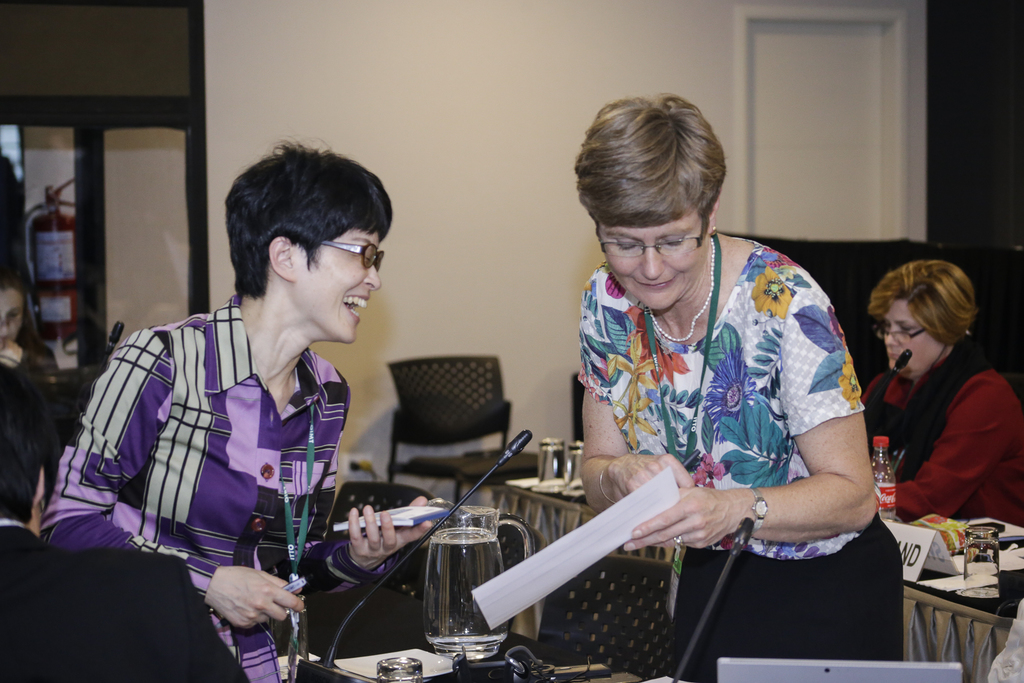
Delegates from Japan and New Zealand share a light moment on day four of the 53rd session of the International Tropical Timber Council. Photo: D. Piaggio/SERFOR
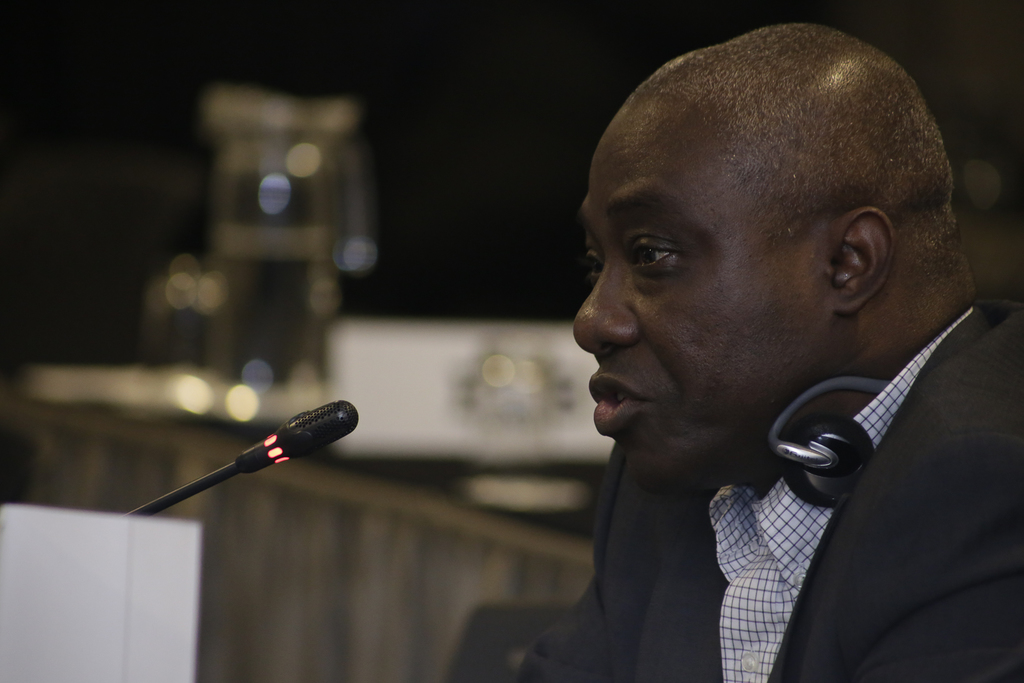
A delegate from Ghana is poised to make an intervention on day four of the 53rd session of the International Tropical Timber Council in Lima, Peru. Photo: D. Piaggio/SERFOR
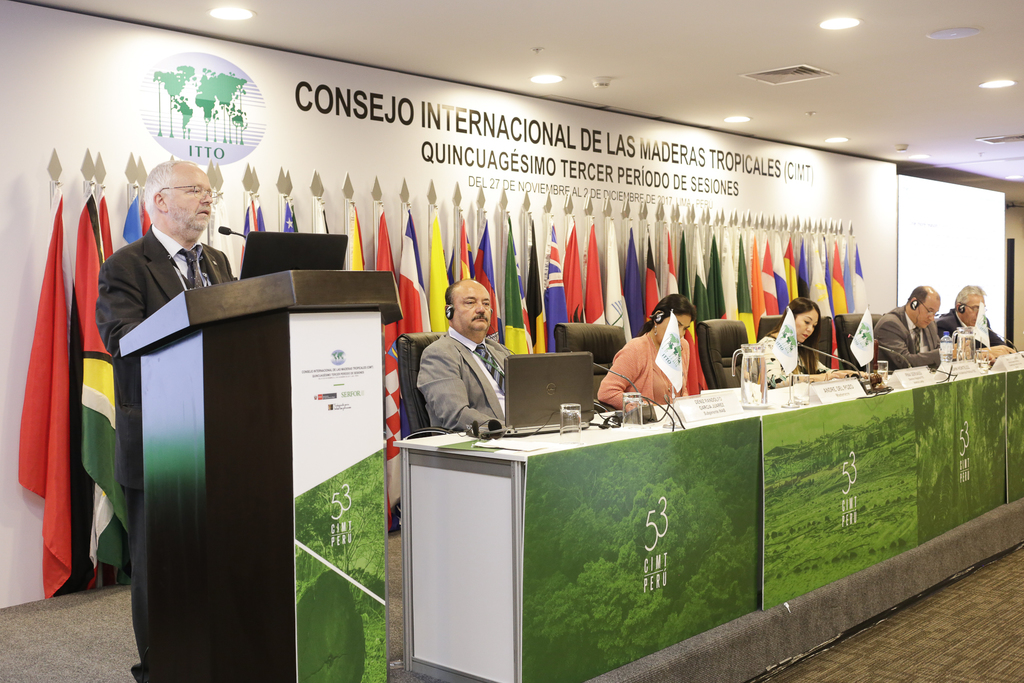
John Hontelez of the Forest Stewardship Council speaks at a side-event organized by the FSC on day four of the 53rd session of the International Tropical Timber Council. Photo: D. Piaggio/SERFOR